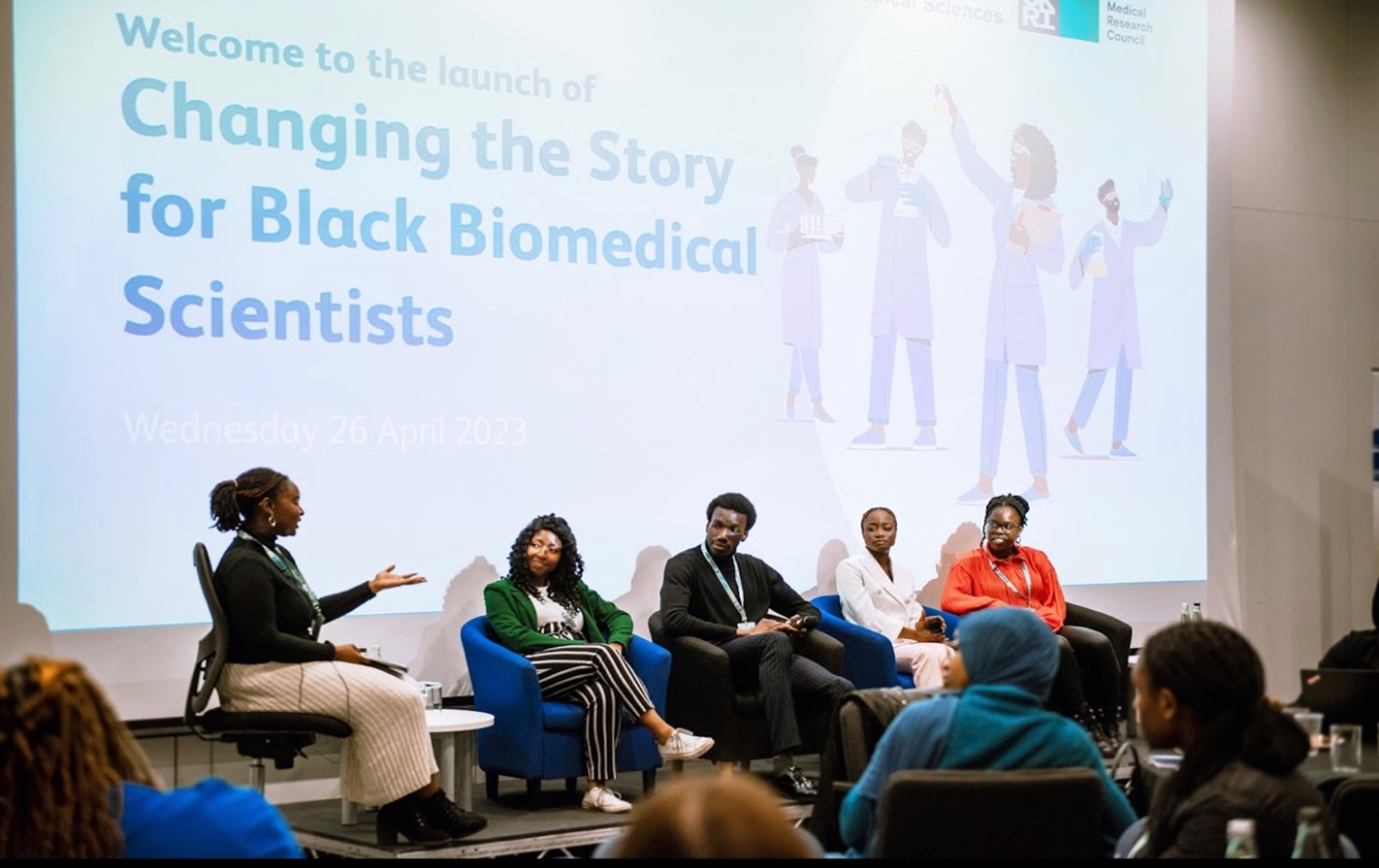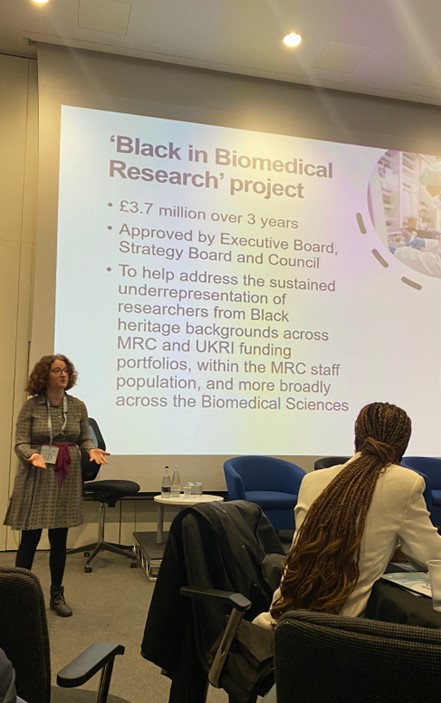Three City St George’s University Student Advisors attended the Changing the Story for Black Biomedical Scientists event with a view to learning more about how we might change the story at City St George's University of London (formely, St George’s, University of London).
Claire Autie, Diib Abdi and Nana Owusu-Sampah share their findings. A special thank you to Dr Bernadine Idowu, University of West London for facilitating this visit.

About the conference
The University of West London's Weston Hall hosted the "Changing the Story for Black Biomedical Scientists" symposium on Wednesday, April 26. The conference's objectives included addressing the underrepresentation of Black scientists in academia as well as encouraging and assisting aspiring Black biomedical student scientists. The conference provided a platform for networking, allowing students to connect with experienced professionals and fellow students, fostering potential collaborations and mentorship relationships.
Representation
Dr. Bernadine Idowu, an Associate Professor in Biomedical Science, gave the keynote address at the conference and discussed the need for representation in Biomedical science. The audience was motivated to pursue academic careers in the sector by her sharing her journey of what motivated her to stay in academia. She was surprised of the lack of Black female professors in Science. Diversity in research is important, there is an under representation of funds researching into diseases affecting ethnic minorities for example Sickle Cell than compared to Cystic fibrosis.
Role models
During the round table discussions, many of the students present expressed feeling a lack of inspiration and role models of similar backgrounds to themselves within academia, which can negatively impact their aspirations and motivation to pursue careers in Biomedical Science. The conference aimed to address this by showcasing successful Black scientists who serve as role models and sources of inspiration for aspiring students.
External organisations
The conference aimed to provide information about available research opportunities and support systems to help students overcome these barriers and pursue their research aspirations. It introduced participants to the Academy of Medical Sciences, Medical Research Council, Black in Cancer, SiSTEM and many more charities and organisations working towards bridging this gap.

Overcoming obstacles
Jordan Osarenren Joel is a PhD Researcher Genetics and skeletal malformations at King's College London who presented at the Conference. Nana comments on Jordan Osarenren Joel’s story:
Nana: Jordan Osarenren Joel’s story was especially memorable to me. He was inspired by a teacher in sixth form to undertake an undergraduate degree in biotechnology and was so determined to study his degree that he fought through many obstacles during his degree such as a sudden loss of funding and personal issues.
Safe space
Diib: It was incredible to hear such relatable stories and have a safe space to understand how many people navigate a field that lacks representation and diversity. In particular, what really stood out to me was that many felt that there was a barrier in pursuing biomedical science after graduating because there was a lack of opportunities available to them and they often did not see those that looked like them in positions that they would like to apply for. It was important to really listen and acknowledge these experiences as although these discussions may be difficult, they are necessary to combat and provide solutions to supporting black students in their biomedical science journey.
Black Women in Science Network
Tomi Akingbade, a PhD student at the University of Cambridge and Founder of the Black Women in Science Network was another panellist who was inspiring:
Diib: Tomi explained how she set up the Black Women in Science Network to advocate for young women passionate about stem as well as create a sense of community amongst Black Women.
This resonated with me as a black woman in biomedical science as I am now aware that there is support available for people like me and a space to connect with like-minded individuals.
Change makers
Diib: Overall, this experience was extremely empowering, I learned so much and was able to have real, honest and open conversations about biomedical science as a black woman. It was great to connect with so many people who had similar experiences and listen to real change makers. I thoroughly recommend university students to attend such conferences in the future and strive to keep evolving the biomedical science field.
Claire: I believe that more discussions should and will be had, and more people like Dr Bernadine should be encouraged to create more inclusive environments to help inspire the youth and create long term changes to create a more diverse and representative environment within the workforce and academia.
Nana: Through the inclusion of varied viewpoints, experiences, and talents, these acts not only benefit the participants but also progress biomedical science. In addition to being morally correct, embracing diversity and fostering inclusiveness is essential for innovation, quality, and social advancement in the field of biomedical science.
Recommendations
Claire Autie, Diib Abdi and Nana Owusu-Sampah share their recommendations:
-
Representation: Increasing the representation of Black Biomedical Scientists is one of the key elements in developing an inclusive environment. City St George's should use targeted recruitment techniques and actively recruit bright Black students to the school. The pursuit of academic and research professions can also be supported financially by scholarships and fellowships created especially for Black students. St. George's can draw a wider range of abilities and viewpoints by exhibiting a commitment to diversity.
-
Mentorship programmes: Mentorship programmes are essential to students' professional and personal growth. Creating mentorship programmes that pair young Black Biomedical Science students with seasoned experts in their industry can be a tremendous source of support, inspiration, and direction. Mentors can assist students in navigating the difficulties they may face throughout their academic and professional journeys by cultivating meaningful relationships. To make these relationships and guarantee the ongoing development and success of Black scientists, City St George's should establish a structured mentorship framework.
-
Opportunities for networking: forging a feeling of community and promoting collaboration, networking occasions and conferences targeted to the need of Black Biomedical scientists are crucial. Students, teachers, professionals, and representatives from research councils, science charities, and industry leaders should all have regular opportunity to network at City St George's. These activities will promote information exchange, teamwork, and the development of a welcoming community.
-
Collaborations and partnerships: Collaborations and partnerships are a possibility to address the underrepresentation; City St George's University should actively seek out partnerships and collaborations with outside organisations to improve prospects for Black Biomedical Scientists. Student access to funds, resources, and special experiences can be provided by research bodies, science charities, and business titans.
-
Curriculum review: To ensure that the accomplishments and difficulties faced by Black scientists in the field are appropriately represented, City St George's should evaluate the inclusivity of its course materials. A more accurate and comprehensive knowledge of biomedical research will be promoted by incorporating multiple voices and viewpoints, which will enhance the educational experience for all students.
-
Outreach: Conduct outreach programs and awareness campaigns to promote Biomedical Science as a viable and rewarding career path for Black students. These initiatives can include school visits, community engagement programs, and workshops that highlight the achievements of Black scientists in the field and inspire young individuals to pursue Biomedical Science. This outreach could also be extended to international students who want to peruse a career in science, especially in countries that do not receive as much government funding towards higher education such as Sudan, Jamaica and Nigeria. This could be done by partnering with state and grammar schools in underprivileged areas.
-
Inclusive Learning Environment: Foster an inclusive and supportive environment within the Biomedical Science course by implementing inclusive policies, creating safe spaces for dialogue, and actively addressing any incidents of discrimination or bias (see our online reporting tool).
-
Career Fairs: Have career fairs where the panellists are from diverse backgrounds and students are able to understand their experience working in the Biomedical field.
Equal Representation in Academia
For existing initiatives at City St George’s, more information is available via Equal Representation in Academia.
About the writers
Claire Autie
Claire is a 2nd year biomedical science student originally from Ivory Coast however was born and brought up in France.: Academically, I have interests in immunology, more specifically in the manifestation of different skin disorders as a result of a compromised immune system such as psoriasis and Varicella-zoster Virus (VZV), as well as sickle cell anaemia which is very common within my community. Outside of university I work with children with Autism Spectrum Disorder (ASD) by creating sessions to help build up their verbal and non verbal communication. I also enjoy fitness and empowering women of all ages to feel more confident in their bodies and at the gym.
Diib Abdi
Diib is 2nd-year Biomedical Science student interested in pursuing a career in research, particularly in the field of Pathology and Immunology.:
Through diverse academic and work experience in the charity sector, I have been able to gain insight into the way science is able to change lives and its potential to transform the world. I am committed to looking ahead and overcoming barriers in healthcare as a black, Muslim woman.
Nana Owusu-Sampah
Nana is 3rd year Biomedical Science student at City St George’s graduating this year:
I have been involved with many projects at this university such as the museum of human diseases, and the Film, Anime & TV society. I enjoy creating a sense of community among my fellow students as shown by my involvement in the university. Additionally, I am committed to contribute my insights and experiences of this conference into improving the experience of black biomedical scientists at City St George’s and in the UK.
Claire Autie, Diib Abdi and Nana Owusu-Sampah